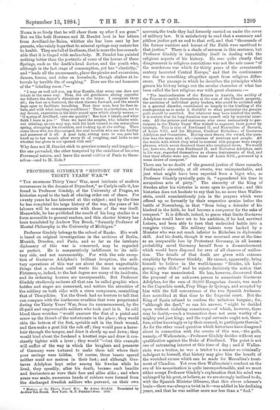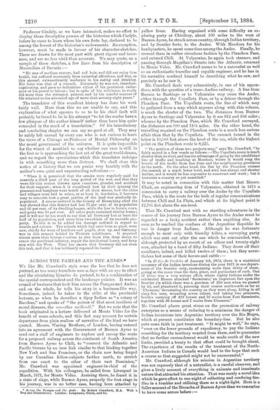PROFESSOR GENDELY'S "HISTORY OF THE THIRTY YEARS' WAR."*
"Tin enormous Thirty Years' War, most intricate of modern occurrences in the domain a Dryasdust," as Carlyle calls it, has found in Professor Gindely, of the University of Prague, an historian equal to the task of educing order out of chaos. For twenty years he has laboured at this subject ; and by the time he has completed his large history of the war, the years of his labours will be commensurate with those of the war itself. Meanwhile, he has published the result of his long studies in a form accessible to general readers, and this shorter history has been translated by Andrew Ten Brook, "formerly Professor of Mental Philosophy in the University of Michigan."
Professor Gindely belongs to the school of Ranke. His work is based on original investigations in the archives of Berlin, Munich, Dresden, and Paris, and so far as the intricate diplomacy of this war is concerned, may be regarded as perfect. He is comparatively indifferent to its mili- tary side, and not unreasonably. For with the sole excep- tion of Gustavus Adolphus's brilliant irruption, the mili- tary operations of this war are about the most unprofitable things that a student could waste his time in mastering. Picturesque, indeed, to the last degree are many of its incidents, and its sickening horrors are unsurpassable. But Professor Gindely studiously eschews all that can be called graphic when battles and sieges are concerned, and notices the atrocities of the soldiery on both sides with a stern composure, resembling that of Thacydides. Yet the Greek had no horrors to tell that can compare with the loathsome cruelties that were perpetrated daring the Thirty Years' War, from its commencement, by the ill-paid and ungovernable soldiers who took i)art in it. In cold blood these wretches "would unscrew the flint of a pistol and screw up the thumb of the unfortunate in the place ; they would skin the bottom of the foot, sprinkle salt in the fresh wound, and then make a goat lick the salt off; they would pass a horse- hair through the tongue, and draw it slowly up and down; they would bind about the forehead a knotted rope and draw it con- stantly tighter with a lever ; they would "—but this example will suffice of the way in which the burghers and peasants of Germany were tortured to make them tell where their poor savings were hidden. Of course, these beasts spared neither maid nor matron in their lust ; and although Gus- tavus Adolphus kept order among his Swedes while he lived, they speedily, after his death, became such bandits and freebooters as were their foes and allies alike ; and when peace was made, numerous bands of robbers were formed from the discharged Swedish soldiers who pursued, on their own • History of the Thirty Years' War. By Anton Gindely. Translated by Andrew TeD Brook. New York: G. P. Putnam's Sous. l834.
accountsthe trade they had formerly carried on under the cover of military law. It is satisfactory to read that a summary and pitiless justice put an end to that evil, and that "thousands of
the former warriors and heroes of the Faith were sacrificed to that justice." There is a shade of sarcasm in this sentence, but
Professor Gindely is impartiality itself in dealing with the religious aspects of his history. He sees quite clearly that disagreement in religious convictions was not the sole cause "of the murderous war which for thirty years of the seventeenth century lacerated Central Europe," and that its continuance was due to something altogether apart from religious differ- ences. The passage in which he describes the principles which govern his history brings out the secular character of what has been called the last religious war with great clearness ;—
"The insubordination of the Estates in Austria, the avidity of the Princes to enrich themselves at the cost of the Church property, the ambition of individual party leaders, who could be satisfied only in a general disorder, contributed so largely to the kindling of the conflagration as to make it doubtful to what particular the greater guilt should be ascribed. But whatever may have kindled the strife, it is certain that its long duration was caused only by material inter- ests. All the princes and statesmen who came successively to par- ticipate in the Thirty Years' War wished to augment their power by triumph. This is tree of Ferdinand II. and Maximilian of Bavaria, of Louis XIII. and his Minister, Cardinal Richelieu ; of Gustavus Adolphus and Oxenstiern. Having once drawn the sword, the ques- tion was the same with all,—increase of territory and people. All the words with which they tried to conceal this purpose were empty phrases, which never deceived those who employed them. We would not, however, deny that Ferdinand II. and Gustavus Adolphus, each in his way, regarded themselves as chosen instruments of God, and that their efforts were not, like those of Louis XIII., governed by a mean desire of conquest."
There can be no doubt of the general justice of these remarks. Ferdinand's sincerity, at all events, was unimpeachable, and just what might have been expected from a bigot who, as Professor Gindely cynically puts it, "squandered his time in scrupulous acts of piety." The sincerity of the King of Sweden after his victories is more open to question ; and this historian does not hesitate to say that he, no more than Wallen- stein, could conscientiously join in the prayers which were offered up so fervently by their respective armies before the battle of Nuremberg, in that "from being a defender of his kindred in the faith, he had become a conqueror for the sake of conquest." It is difficult, indeed, to guess what limits Gustavus Adolphus would have set to his ambition, if he had survived Lutzen, and been able to turn that undecided battle into a comglete victory. His military talents were backed by a
Minister who was not much inferior to Richelieu in diplomatic skill. And his death, though it was mourned over at the time as an irreparable loss by Protestant Germany, in all human probability saved Germany herself from a dismemberment
which would have disposed for ever of all chances of unifica- tion. The details of that death are given with extreme simplicity by Professor Gindely. He cannot, apparently, bring himself to believe in the world-famous " Bruder, ich habe genug ; rette dich ;" and he rejects decisively the notion that the King was assassinated. He has, however, discovered that the proposal of an unknown person to assassinate Gustavus Adolphus, for the sum of 30,000 Hungarian ducats, was made to the Capuchin monk, Fray Diego de Quiroga, and accepted by him with the full concurrence of the two Spanish Ambassa- dors accredited at that time to the Imperial court. But the King of Spain refused to confirm the nefarious bargain; for, "although the deed," so ran his answer, "might be decided upon without violating conscience,—of which, however, there may be doubt,—such a transaction does not seem worthy of a mighty and just king ; and the royal servants ought not, there- fore, either knowingly or by their counsel, to participate therein."
As for the other vexed question which historians have disagreed about in connection with the events of this war,—the guilt, namely, of Wallenstein,—Professor Gindely decides without any qualification against the Duke of Friedland. The point is not one of entrancing interest at this time of day ; and if Wallen- stein was a traitor, he was a traitor to a master so criminally indulgent to himself, that history may give him the benefit of the wretched excuse which can be made for Messalina's treat- ment of Claudius. Yet even then Wallenstein's conduct on the
eve of his assassination is quite incomprehensible, and we must either accept Professor Gindely's explanation that his mind was unhinged by his gout, or believe, as we are strongly inclined to do, with the Spanish Minister Olivarez, that this clever schemer's brain—there was always a twist in it—was addled in his declining years, and that he was neither more nor less than a "fool."
Professor Gindely, as we have intimated, makes no effort to display those descriptive powers of the historian which Carlyle, before he came to learn where his own forte lay, declared to be among the lowest of the historian's endowments. An exception, however, must be made in favour of his character-sketches. These are drawn for the most part with great vigour and terse- ness, and are no less vivid than accurate. We may quote, as a sample of these sketches, a few lines from his description of Maximilian of Bavaria :-
"lie was of medium stature, had red hair, and did not enjoy firm health, but suffered constantly from catarrhal affections, and was, on this ground, extraordinarily moderate in his eating and drinking. His voice was that of a eunuch. Externally he was not, therefore, captivating, and gave no indications either of his persistent endur- ance or his power to labour; but in spite of his sickliness, he really did more than the strongest princes, and by his careful manner of life attained to the advanced age of more than seventy-eight years."
The translator of this excellent history has done his work fairly well. More than this we are unable to say, and this explanation of what appears to us to be his chief fault will probably be found to lie in his attempt "to let the reader have a few glimpses of the author himself rather than have him quite concealed in the mask of a translation." Of his introductory and concluding chapter we can say no good at all. They may be safely left unread by every one who is not curious to learn the views of a Chicago ex-Professor of Mental Philosophy on the moral government of the universe. It is quite impossible for the wisest of mankind to say whether our race is still in the first or is approaching the last act of the great world-drama, and we regard the speculations which this translator indulges in with something more than distrust. We shall close this notice of a history that we can praise very heartily with the author's own quiet and unpretending reflections :—
" When it is perceived that the armies were regularly paid for scarcely a third part of the long period of the war, and that they were for this reason thrown upon exactions, plunder, and accident for their support ; when it is considered how by their tyranny the peasants and burghers were bereft of all their means, how the cities and villages were laid in ashes, or at least in desolation, it becomes easy to conceive how a great portion of the land was gradually de- populated. A census ordered in the County of Hennebarg after the war showed that this district had lost 75 per cent, of its population and 66 per cent, of its dwelling-houses, while the loss in horses, cows, and goats was 80 per cent. All other parts sustained similar losses ; and it will not be too much to say that all Germany lost at least the half of its population, and more than two-thirds of its movable pro- perty. To this is to be added the damage suffered in regard to morals and culture. The schools which had once been so good, were now, chiefly for want of teachers and pupils, shut up, and Germany was in this respect behind its Western neighbours. It required almost more than human exertion to rise from this deep decay, to renew the paralysed industry, repair the intellectual losses, and keep step with the West. Time has shown that Germany did not shun this task, and that it has brilliantly repaired its losses."



































 Previous page
Previous page